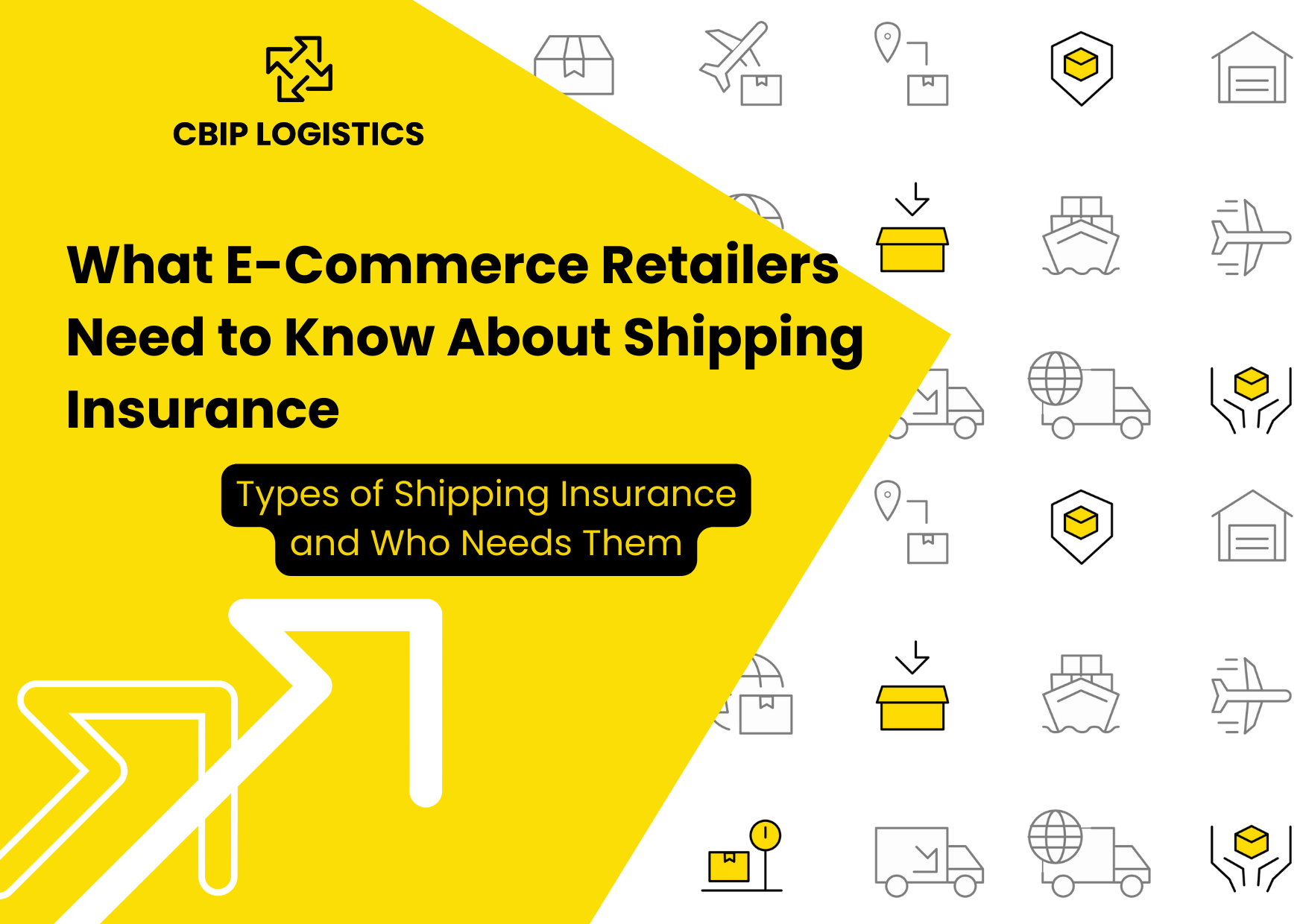Everything You Need to Know About E-Commerce Shipping Insurance

We’ve had a handful of clients asking about shipping insurance, but frankly, less than expected. Considering recent issues with cargo loss and theft, I think shipping insurance should be something more e-commerce brands are considering to protect themselves.
Why? The fact is, if you are an e-commerce brand sending your products around the world, there are many different hands managing your work. You have a factory, freight forwarder, warehouse, carrier company, and a list of other intermediaries as your items clear customs and cross the world.
When passing through all these hands, liability becomes a more complicated factor. At any given moment in your supply chain, something could happen to your goods.
The question is; if your goods are lost, damaged, or stolen, who foots the bill? To answer that question, we need to get into liability and different types of insurance throughout the supply chain.
As an e-commerce brand, there are three types of insurance you may use.
- Limited liability insurance: You rely on the warehouse or carrier's own insurance to cover you in the case of loss or damages
- Marine cargo insurance: You purchase a policy through a third-party
- Consumer delivery insurance: You pass on the delivery portion of the insurance to the customer, giving them the option
Read about CBIP's Adaptable 4PL Logistics Services
Three types of insurance for e-commerce logistics
1. Limited liability insurance
Legally, all logistics providers like carriers and warehouses must have their own insurance policies to cover themselves.
Those policies ensure that the provider won’t be on the hook for the cost of items damaged and that you as the customer get paid out by the insurance if something happens to your goods.
Logistics providers have a legal financial responsibility to you when they damage or lose your goods, but only in certain situations and up to a certain amount. And only when you can prove it was due to their negligence.
That makes relying on limited liability insurance the riskier choice for the e-commerce company.
Different types of carriers have different standard liability policies. Here is what most carrier types are legally obliged to pay out when something happens to a retailer’s goods on their watch.
|
Carrier Type |
Standard Payout |
|---|---|
|
Parcel carriers |
Usually amounts to damage or loss up to $100 for individual items and cents on the pound for the total weight of a large shipment. |
|
Ocean carriers |
A max of $500 for containers is customary. |
|
Domestic air carriers |
$0.50 on the pound. |
|
LTL shipments |
Can range from $.10 to $25.00 per pound, but typically is around $0.50 per pound |
|
Full truck load |
The customary max payout is $100 thousand |
More than half of all these claims are denied entirely. Claims can also take months to settle, and they don’t cover bad weather, natural disasters, or stolen items.
2. Direct to Consumer (B2C) or Marine Cargo Insurance
The second type is typically referred to as marine cargo insurance.
This type of policy is purchased privately by the e-commerce retailer through a third-party insurance provider. Although the name suggests only maritime coverage, it is actually a broad term for private shipping insurance that can typically provide door-to-door coverage.
Unlike relying on carrier limited liability, you can insure your products for their entire value. Plus, you don’t have to wait for claims processing like with limited liability.
With 3rd party marine cargo insurance, claims are typically paid within a month following their submission
Marine cargo insurance covers quite a bit more than were you to rely solely on the insurance payouts of the carrier or warehouse you were using. While policies vary, Marine cargo insurance will typically cover you throughout the entire journey of your goods. That includes:
- Picking up the freight at origin, i.e. your manufacturer
- Door-to-door transportation
- Warehousing
- Delivery to the customer
Imagine your cargo is lost at sea in a storm. Consider what would happen if you had settled with the carrier’s limited liability insurance, versus purchasing a marine cargo insurance policy.
Unlike the measly $500 you would probably be paid out under standard shipping laws, your marine cargo insurance would reimburse for the entire amount lost. If your cargo load is worth hundreds of thousands of dollars, that $500 you’d receive under the vessel’s limited liability insurance is going to be very little consolation.
How it works
In general, marine cargo insurance rates run between 1 and 3 percent of the total cargo value, depending on a variety of factors.
Different types of insurance can be paid on a per-voyage basis, but the typical policy is paid on an annual basis (often called a blanket policy). That premium is paid on an annual basis based on the activity forecasted by the brand.
For example, say you got coverage for $1 million on your premium, then in July, you have $1.3 million worth of inventory sitting in your warehouse. If you lose all your inventory in a storm during that year, you would only receive a $1 million payout.
RELATED: How Technology Is Transforming Logistics: The Shipping Edition
3. Consumer delivery insurance
There is a third type of insurance sometimes involved in e-commerce delivery called consumer delivery insurance. This is when a consumer purchases goods and wants to get them insured if they are damaged or lost.
Having the option to purchase package insurance at checkout is not a common experience for most shoppers. However, if you are shipping luxury or fragile goods, it’s a good thing to look into.
In 2022, 79% of Americans were victims of porch piracy, the term coined for packages stolen from customers after delivery. Most online shoppers are wary of this, and may not feel comfortable buying higher-value goods online.
Giving customers the option to buy shipping insurance can help reduce shopping cart abandonment. Plus, it will save you from having to account for those stolen or damaged goods on your books
How it works
Consumer delivery insurance is offered through the carrier, so the option to purchase this insurance at checkout depends on what carriers the e-commerce brand uses.
Who needs shipping insurance?
The truth is, many e-commerce retailers don’t have insurance for one simple reason: They don’t need it.
It isn’t always easy to know when insurance is your best financial move. Some of our customers who we’ve spoken to about shipping coverage think they want to purchase an insurance policy at first. Then, they do the math and figure out that it would cost them more or the same to insure their cargo as it would to simply pay out of pocket if something happens.
As with any insurance, you assess whether the risk warrants the cost of the premium. However, given the delays that many brands are experiencing with their providers and last-mile carriers, more brands should be looking into shipping insurance — particularly brands that find themselves writing off a lot of stock.
As a brand, how do you assess if shipping insurance is needed? Start by looking at the value and/or fragility of the individual product, and the total value when shipping products in bulk.
- For high-value and/or breakable things, it may be worth it to purchase a premium that insures the product for its entire journey, including last-mile delivery.
- Low-value product sellers may opt instead for a premium covering only freight transport and warehousing inventory. Nixxing last-mile services, or giving the customer the choice to insure or not with consumer delivery insurance, makes more sense for these types of shipments (due to the loss of a bulk shipment of cheap items costing much more than the loss of one cheap item on its final journey to the customer).
While not all e-commerce retailers will require insurance, it's worth considering what you stand to lose if you aren’t covered. If you have done a cost-benefit analysis and still can’t determine what decision to make, look to professionals in your industry for guidance.
Find out what other retailers in your industry are doing to protect themselves against losses and follow their example, or learn from their mistakes. If you feel you need more personalized guidance on the matter, try working with a trusted logistics consultant to help inform your logistics moves.






